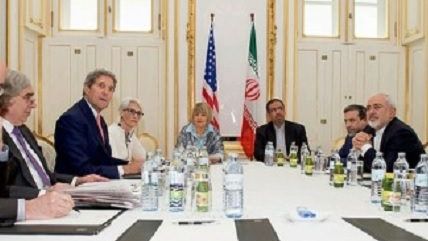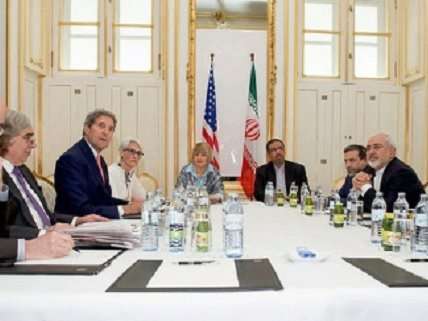Iran Talks Look Set to Blow Through Yet Another Deadline
Two years and counting


If negotiators in Vienna don't come up with a deal by midnight tonight (unlikely), the review period Congress set for itself in Iran legislation that passed in April will be extended from 30 days to 60. The legislation, signed into law by President Obama, requires the secretary of state to provide Congress an analysis of the deal. Congress will have 60 days to vote to approve the deal—if they vote against the deal, the president will be able to veto Congress. If there's no vote in the time allotted then the deal, which will involve sanctions relief, can move forward.
If Sens. Bob Corker (R-Tenn.) and Bob Menendez (D-N.J.), the chair and ranking member, respectively, of the Senate Foreign Affairs Committee, who sponsored the Iran Nuclear Review Act, intended for it to place pressure on Iranian negotiators, it may have had the opposite effect. CNN talked to various unidentified administration sources, who:
would not predict whether a deal would be done by Friday. Most of the issues, the sources said, will take high-level political decisions by Iranian leadership that they may not be willing to make this week.
"If Iran made the decision and said, 'fine, we have a deal,' we could have a deal today and finish up writing the agreement in a couple of days," a senior administration official said. "But they may need to show that (they) are willing to walk away for a while and come back later. They also may need to go back one more time to the Supreme Leader."
Sen. Dick Durbin (D-Ill.) says President Obama told him he believes there's a less than 50-50 chance of negotiations being successful. Sticking points include how quickly sanctions will be lifted, whether the arms embargo will remain in place, inspection of military sites, and an accounting of Iran's previous nuclear research. On the last item, the Obama Administration has pointed to the Iranian supreme leader's fatwa banning nuclear weapons as an impetus to get a deal done. Accounting for previous weapons research now would open the government to being accused of violating a religious edict, and is creating new complications.
Temperatures in Vienna are hitting record highs, and Secretary of State John Kerry and Iranian Foreign Minister Javad Zarif were reportedly in a shouting match yesterday. Russia, participating in the talks, has been pushing an end to the arms embargo—which would require approval by the U.N. Security Council. Zarif did not appreciate comments from Western negotiators about Iran's role in regional instability, pointing to the West's support of Iraq in the 1980s Iraq-Iran War. The U.S., meanwhile, is preparing defense contracts totaling at least $6 billion to send military equipment to Israel and Gulf Arab states concerned about any Iranian nuclear deal.


Show Comments (49)